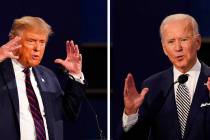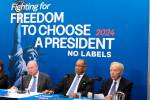Candidates, please stop whining
Now that Hillary Clinton and Donald Trump have scored their comfortable victories in the New York primary, can everybody please stop bellyaching? Neither party’s presidential selection system is perfect, as several candidates have been loudly proclaiming, but each has more virtues than shortcomings.
Trump and Vermont Sen. Bernie Sanders have complained that the rules are rigged against them. The billionaire is unhappy because his nomination isn’t inevitable even though he’s gotten far more votes than any Republican rival. The Vermont senator is cranky about superdelegates — more than 700 party and elected officials who will go to the Democrats’ Philadelphia convention in July without having been chosen in primaries or caucuses. They’re free to back any candidate, and most of them favor the former secretary of state — a fact that Sanders sees as evidence that the establishment has stacked the deck against him.
Both charges are specious. For starters, nobody’s rules have changed since the candidates entered the fray.
On the Republican side, the delegate-selection process was designed by the states. It’s consistent with longstanding Republican ideology, which holds that state and local decisions are preferable to national edicts. That means that state decisions should mean more than national vote totals. Perhaps as a party newcomer, Trump doesn’t appreciate that point of view.
It’s easy to see why Trump could be unhappy. Even with his big win on Tuesday in his home state it’s still a slog to get to the 1,237 delegates necessary for the nomination at the party’s Cleveland convention.
Texas Sen. Ted Cruz remains a formidable challenger despite his weak finish in New York, and the ultimate outcome won’t be decided at least until the final contests on June 7, which include California. More likely, the battle will continue at the convention.
But nobody’s a victim of unfair rules. Trump lost to Cruz in places such as Colorado and Wyoming because the Cruz campaign outsmarted and outworked his side.
State rules have helped Trump in some places. On March 15, for example, he beat Cruz by less than two-tenths of a percentage point in Missouri but won 71 percent of the delegates, 37 to Cruz’s 15. Winner-take-all contests in Florida and Arizona delivered bonanzas to Trump as well.
Sanders’s complaints about superdelegates are just as ill considered. About 15 percent of the 4,766 Democratic delegates are governors, senators, congressional representatives or top party officials. They are not bound by state or district vote. Sanders portrays them as representatives of an elite establishment free to ignore the wishes of their voters.
There are two fallacies here. The first is that Clinton lags among voters. She doesn’t. She’s won many more votes than Sanders. The other is the notion that superdelegates reflexively line up with the leading establishment candidate. Eight years ago, Clinton was the establishment contender. Then Illinois Sen. Barack Obama convinced politicians he would be a stronger candidate and many superdelegates backed him — including, privately, House Speaker Nancy Pelosi, D-California.
Superdelegates want someone who can win and presumably govern effectively. Their consensus represents peer review, input from the men and women best able to gauge political competence.
It was the turbulent Democratic election of 1968 that set the stage for this. When President Lyndon Johnson bowed out, Sens. Robert F. Kennedy and Eugene McCarthy won most of the primaries. But Kennedy was assassinated and the convention, dominated by party bosses, tapped Vice President Hubert Humphrey.
Liberal activists, outraged, shook up the rules. After awhile, realizing the value of some peer review, Democrats arrived at the current mix; the number of super delegates this time actually is about a quarter less than in 2008.
The political parties are weaker today. But that has less to do with nominating process and more with the influx of big money.
There are deficiencies on both sides but nothing is crooked or rigged. Trump has been opposed by the majority of Republican voters and does miserably in general-election polls. Any outcome on either side is likely to be in sync with most voters.
Albert Hunt is a Bloomberg columnist.























